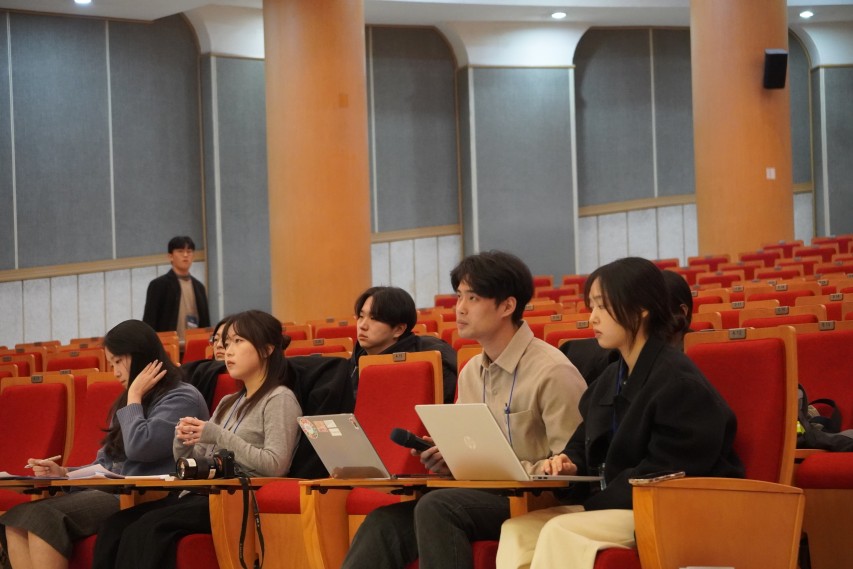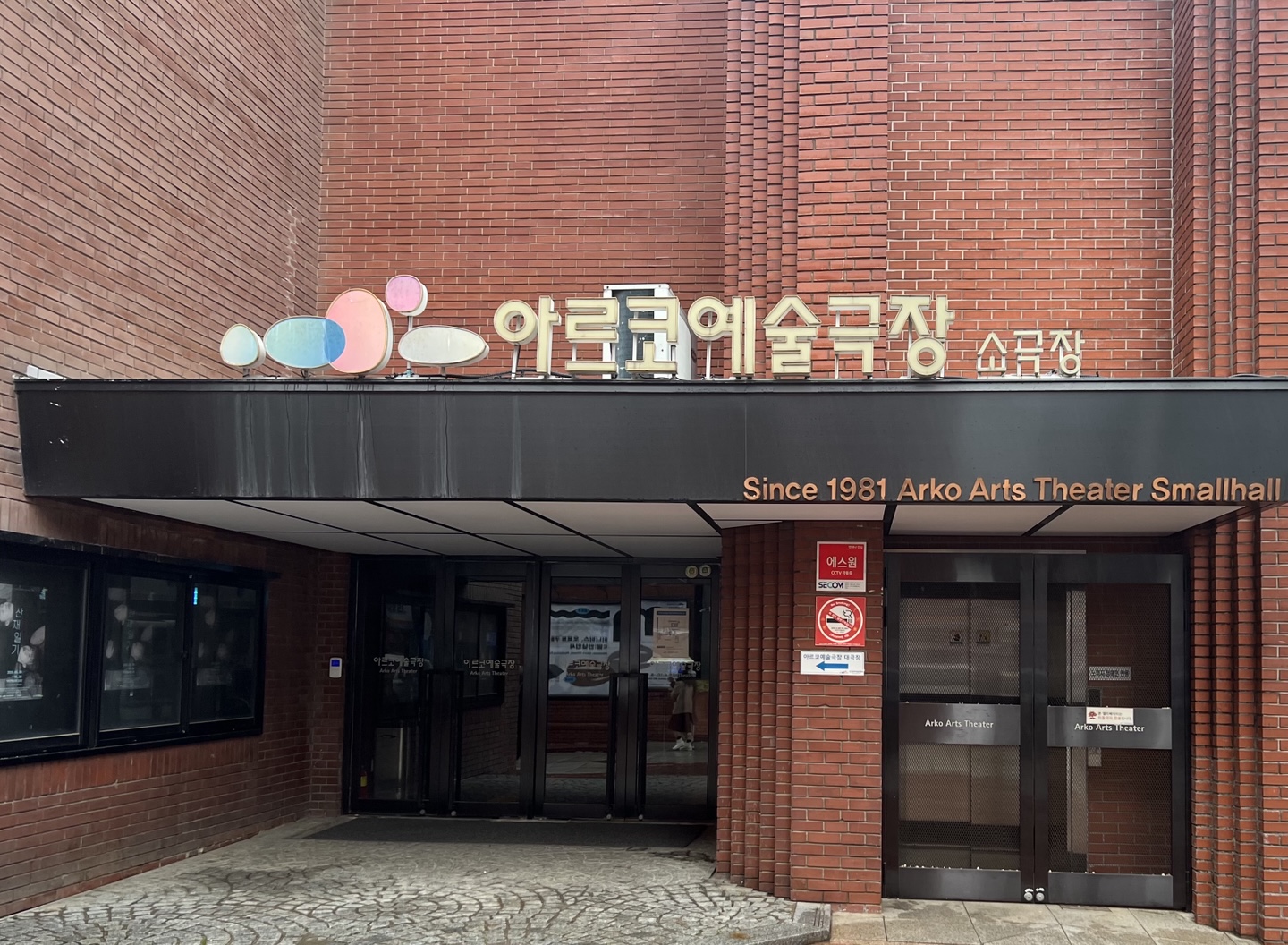[Campus] 2025 GSA By-election: Public Hearing Media Query
 KnocKH responding to reporters' questions
KnocKH responding to reporters' questions
The public hearing session for the Kyung Hee University (KHU) Seoul Campus General Student Association (GSA) by-election was held on March 19 at Crown Concert Hall. During the session, the University media outlets, The University Life, Daehak Jubo, and Voice of University Seoul branch conducted a media query session with the sole candidate, KnocKH.
Questions about KnocKH’s Values
Q1. What do you think the true meaning of university society is?
A1. University society is a community that connects students, schools, and local and global communities. Moreover, I believe university is not just a pre-phase of the job market but a place to learn how to be responsible as a member of our society. KHU students should act as members of society beyond being students of the University. We think representativeness is very important in university society. Since GSA is a body that represents students, we believe GSA should continuously know how to deliver students’ requests to the university. We, as student representatives, will try to help students actively participate in university society. We are not just talking about communication as a cliché, as seen in typical student associations. We aim to establish a more practical and effective form of communication that students can genuinely find meaningful.
Q2. With indifference toward student self-governance growing, KnocKH's candidacy seems meaningful. How does KnocKH plan to reinforce the value of student self-governance?
A2. We are regrettable that more and more universities are failing to elect GSA. We believe this is due to GSAs often focusing on events like festivals, not for enhance the effectiveness of student self-governence. Under this situation, we will ensure more convenience and a sense of efficacy for the students by robust communication.
Detailed Questions about KnocKH’s Policies
Q3. Promises for minorities, such as the disabled, seem insufficient. How would you make The University a place that embraces minorities?
A3. We are aware that the barrier-free accessibility problem at the Seoul Campus is serious, with outdated and limited information. Therefore, we will discuss measures such as tactile maps and braille paving blocks to ensure that KHU becomes a truly barrier-free zone.
Q4. Since all data on the GSA website has been completely deleted, it is not a matter of recovery but rather rebuilding the website. Are you aware of this situation? How do you plan to secure the necessary funding, which is estimated to be around one million won? What specific measures will you take?
A4. As I have experience developing a website for my own business, I am aware of the situation and costs involved. However, regardless of the cost, the website must be rebuilt. Furthermore, despite financial difficulties, easily accessible website-building tools are available, demonstrating the feasibility of this promise.
Q5. There is already the meeting holding student representatives vice-president Ji Eun-lim, and school officials. What is the difference in the promise of
regular meeting between the student representative and the vice president?
A5. From my experience attending these communication meetings, it was difficult to make actual decisions leading to real action. Therefore, we are planning to organize a conference system with binding force, which will bring actual progress.
Q6. Given concerns about whether the University will take the Academic Symposium on Finance and Revenue, what is your detailed operational plan for the event?
A6. We understand concerns about the University’s stance. However, we do not believe that giving up simply because the University rejects an idea is the right attitude for a GSA. GSA should convey students’ opinions to the University more directly and consistently. Since we prioritize student communication, this is not the only policy for finance. It is one of the options for addressing financial issues. Additionally, we will collaborate with the University’s departments to encourage student participation.
Q7. How would you make the professors reveal the midterm and final grades on Info 21 mandatory?
A7. We plan to operate a reporting system to identify lectures that do not disclose grades. Regarding enforcement measures, we will discuss with professors and the University how to make this work effectively.
Q8. The proposal for adopting absolute evaluation for elective course disapproval despite the four task force meetings last year. What is your plan to reach a compromise?
A8. Last year, the Humanitas College Undergraduate Committee called for the adoption of absolute evaluation, but it was not fully implemented due to the gradual introduction by the Global Campus. In preparing this promise, we identified a lack of communication as a key issue. Until last year, student representatives from the Seoul and Global Campuses had no opportunity to share their opinions together. However, with the establishment of the Joint Central Executive Committee last year, the Humanitas College Undergraduate Committees from both campuses and the GSA plan to unite and present a collective stance to the University once again.
Q9. How many times do you plan to open the session? Did the Office of Planning & Coodrnation (OPC) agree about this?
A9. The OPC responded that they are eager to hold a financial operation briefing session if students request it. They are considering holding the session once or twice per semester, and are working toward the ability to hold it immediately whenever students request it, beyond regular openings.
Q10. Where do you think the tuition increase revenue should be allocated by priority?
A10. According to the survey by Daehak Jubo, students want the revenue to be used for improving facilities and expanding scholarships. Since KnocKH aims to be a GSA that represents KHU students, we believe the revenue should be used for improving facilities by priority as well. Additionally, we will hold an Autonomous Budget Management Committee for the transparency of finance.
Q11. There may be differences between the students' demands and the University's opinion regarding tuition fee increases. In such cases, how do you plan to resolve the issue?
A11. If that happens, we will be on the side of the students and try to convince the Univrsity. However, we do not think that the University will oppose using the revenue for facility improvements considering the responses from the financial operation briefing session before.
Q12. Are there any detailed plans for the promise of offering extra points for KHU students in corporate-linked extracurricular activities? What are some specific examples of corporations or activities that you are referring to? Can you explain more about how the extra points will be given to students, and if there are any similar projects from other universities?
A12. We are planning to collaborate with the Office of Career Development in KHU, which we have already contacted and received positive responses. Students will receive extra points when they apply for marketing supporter programs, similar to the referral recruitment program conducted by the Office of Career Development. There weren't any similar cases from other universities, but this does not mean that we cannot.
Q13. The facility reservation service is included in the new integrated application (app), but it currently lacks full coverage due to the responsibility being divided among individual departments. How do you plan to address this issue and ensure a fully integrated reservation system?
A13. We will have the facility managed by GSA, by requesting the administration department that is in charge of the integrated app.
Q14. What do you think the most urgent problem of the integrated app is? Additionally, how would you address the financial problems?
A14. The biggest issue with the integrated app is that its features do not function within the app but are instead linked to external websites. When we met with the department in charge of the integrated app, they expressed a desire to hear students' opinions on what they need. Of course, financial constraints exist, but I would like to emphasize that the department is committed to improving the app.
Q15. Candidate Eom, you were a member of KHUBE last year, and some might see KnocKH as an extension of KHUBE. The previous student council failed to fully implement the Grand Stadium turfing project. Are you willing to carry it forward?
A15. I want to make it clear that being a member of KHUBE does not mean we are simply continuing the previous student council’s work. Regarding the Grand Stadium turfing, we held several meetings with the relevant department. In the case of the Seoul Campus, difficulties arose due to parking issues. However, since turfing is included in the Space 21 project, it will eventually be possible, but at present, it is challenging.
Q16. The former GSA, KHUBE, promised to open a joint account, but this has not been accomplished. Do you have any plans to take over this project and open the account?
A16. If discussions with KHUBE indicate an increasing need for a joint account, we are willing to follow through on their promise. We have not received anything from KHUBE yet, but if elected, we will discuss this matter with them.
Q17. KHUBE made a promise to change the names of the former College of Korean Medicine and the former College of Sciences buildings. However, since this is the president Kim Jin-sang’s first year in office, they decided to postpone this initiative for the sake of operational stability. Does KnocKH plan to continue this effort?
A17. Last year, we proposed this issue with GSA during a communication meeting and formally requested it from the university administration. Additionally, we conducted a survey among students who use these buildings and shared the results with the university. While the administration stated that immediate action would be difficult, KnocKH believes that the current names diminish students’ sense of pride and belonging and make navigation harder. We plan to continue discussions on this matter.
Q18.Are there any other plans to increase student engagement in the festival besides expanding the student participation booths?
A18. We were inspired by the festival held at the Global Campus last year and decided to organize a student-engaged festival. We plan to create special programs where students can actively participate, such as reenacting popular Korean music TV shows like "King of Masked Singer" and "I Can See Your Voice."
Q19. Is not space too limited for such a student-participation-based festival at the Seoul Campus? The Global Campus was able to host it because the Grand Stadium was used as the main venue, allowing booths and stages to be placed together. How do you assess the feasibility of this in Seoul?
A19. Since our idea for a participation-based festival involves voting, we do not believe space will be a major issue. Additionally, last year, the Business School successfully held a student-engaged festival, so we do not see spatial limitations as a significant problem.
Q20. KHUBE mentioned that they will transfer their promise, registering MASTERPEACE to KHU's festival trademark. Since you will not have much time to prepare for the upcoming festival, how do you plan to organize it? Also, since you emphasize sustainability, do you intend to take over the trademark registration process?
A20. We are aware that KHUBE has partially fulfilled this initiative, and if elected, we plan to take over and proceed with it. The specifics will be discussed after the election.
Q21. There was a promise to reduce the difficulties for international students in participating in the festival. What do you think these difficulties are?
A21. We spoke to the former president of the General International Student Association, who mentioned that many international students struggle to participate in the festival. They often do not know when or how it takes place or how to join event programs, even if they want to. We will collaborate with the General International Student Association in the festival planning process to ensure international students are actively involved.
Q22. Regarding the international student Buddy Program, what specifically does “expanding opportunities” mean? Does it refer to extending the program duration, increasing the number of participants, or expanding the range of eligible courses?
A22. Expansion refers to the target group. Currently, the Buddy Program is only for exchange students, but we aim to include international students as well. Like exchange students, international students also face adaptation challenges and have limited opportunities to interact with Korean students.
Q23. Currently, participants in the Buddy Program receive a 400,000 won scholarship. Expanding the program would require a larger budget—how do you plan to address this need for additional funding?
A23. We believe this is a matter that can be thoroughly discussed with the scholarship office.
Q24. One of your promises was to establish a monitoring team to improve hygiene in the student cafeteria. Will this team be composed of students?
A24. Yes, we plan to recruit students for the monitoring team and provide them with meal tickets for two to three weeks. Afterward, they will complete a survey about their experiences, including what they liked, disliked, and what needs improvement.
Q25. How do you plan to enhance communication with the Global Campus? There are ongoing issues such as absolute grading for general education courses and the dual-campus system.
A25. Last year, the Joint Central Executive Committee was reformed. This committee allows student representatives to hold regular meetings as needed. We plan to use this as a direct communication channel to hear students’ opinions.
Q26. Due to the shortened term, there are concerns about the feasibility of implementing your promises. How do you plan to address this? Also, what is the first promise you want to fulfill?
A26. Considering this is a by-election, we carefully designed our promises to be achievable within the given term. We are confident that we can fulfill all our commitments. The first promise we want to implement is related to financial matters. Tuition fees have increased, but students have had limited opportunities to communicate with the school. Additionally, we want to revitalize the Autonomous Budget Management Committee within each college’s administrative office.
There are no registered comments.
- 1
- 2
- 3
I agree to the collection of personal information.




